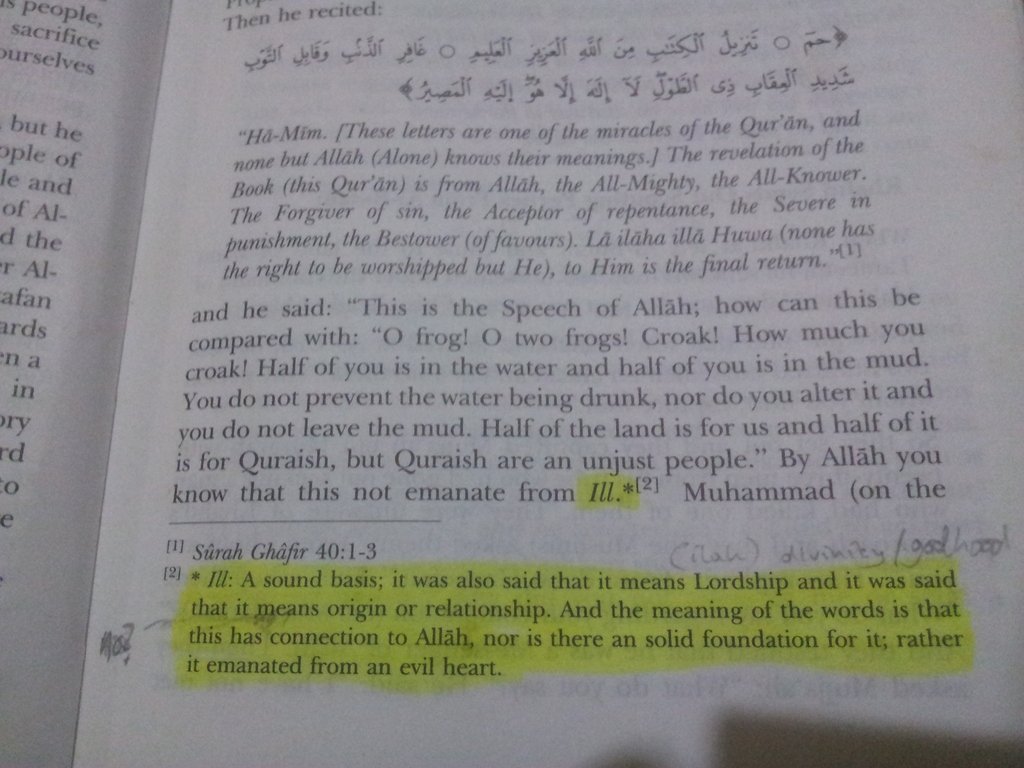il, el, ilah, Allah, ilaahana and elohenu use the same semitic root.
However the Arabic term Allah is unique and now tied to it's unique descriptive qualities which brother Hudayfah ibn Adam described.
You may wan't to ask your friend if they are the names of moon gods or whether they point to divinity.
God (Elohim, Eloah, El, Elah, Theos)
The word “God” in Hebrew:
There are three Hebrew words that are translated “God”:
Eloah (God) in the Hebrew text of Psalm 18:31.
’Eloah
Strong’s Concordance number: 433
Bible references: Ps. 18:31 and about fifty times in total (with about forty of those in the book of Job).
For who is God besides the Lord?
And who is the Rock except our God? (Psalm 18:31, NIV)
’Eloah is likely to be the Hebrew word from which the other two are derived. Some scholars suggest the roots of the word have to do with fear. That might be a reflection of the attributes of God that cause people to be afraid of Him (Ps. 76:12; Isa. 8:13). Alternatively, God is the one to whom we can run for help when we are afraid.
’Elohim
Elohim (God) in the Hebrew text of Genesis 1:1.
Strong’s Concordance number: 430
First Bible reference: Gen. 1:1 and over 2300 times.
In the beginning God created the heaven and the earth. (Genesis 1:1, KJV)
’Elohim is the plural of ’Eloah. It places more emphasis on God’s strength, might, and power. It is used as a generic word meaning “god” and applies to pagan gods and goddesses. Although it is usually treated as a singular word, it sometimes occurs alongside plural verbs and adjectives. Notice the use of “Us” and “Our” in Genesis 1:26; 3:22; 11:7.
’El is often found as a name for God in Semitic languages.
Again this word points to the power and might of God. Like the word ’Elohim, it occurs in compound names of God.
The plural ’elim is part of the name God of gods (’El ’elim). The possessive ’Eli means “my God.”
Allah (/ˈælə, ˈɑːlə, əlˈlɑː/;[1][2] Arabic: الله, translit. Allāh, pronounced [ɑɫ'ɫɑh]) is the Arabic word referring to God in Abrahamic religions. The word is thought to be derived by contraction from al ilāh, which means "the God", and is related to El and Elohim, the Hebrew words for God.
Sh'ma Yisrael Adonai Eloheinu Adonai Eḥad - "Hear, O Israel: the LORD is our God, the LORD is One."
The literal word meanings are roughly as follows:
Sh'ma — listen, or hear and do (according to the Targum, accept)
Arabic: isma'
Yisrael — Israel, in the sense of the people or congregation of Israel
Arabic: Isra-eel
Adonai — often translated as "LORD", it is read in place of YHWH; Samaritans say Shema, which is Aramaic for "the [Divine] Name" and is the exact equivalent of the Hebrew "ha-Shem", which Rabbinic Jews substitute for "Adonai" in a non-liturgical context such as everyday speech.[citation needed]
Arabic: ......rabb?
Eloheinu — the plural 1st person possessive of אֱלֹהִים Elohim, meaning “our God”.
Arabic: ilaahana
Echad — the unified and cardinal number one אֶחָד
Arabic: Ahad
The Arabic components that build-up the word "Allah":
1. alif
2. hamzat waṣl (همزة وصل)
3. lām
4. lām
5. shadda (شدة)
6. dagger alif (ألف خنجرية)
7. hāʾ
The etymology of the word Allāh has been discussed extensively by classical Arab philologists.
Grammarians of the Basra school regarded is as either formed "spontaneously" (murtajal) or as the definite form of lāh (from the verbal root lyh with the meaning of "lofty" or "hidden").
Others held that it was borrowed from Syriac or Hebrew, but most considered it to be derived from a contraction of the Arabic definite article al- "the" and ilāh "deity, god" to al-lāh meaning "the deity", or "the God". Unique.
The majority of modern scholars subscribe to the latter theory, and view the loanword hypothesis with skepticism.
Cognates of the name "Allāh" exist in other Semitic languages, including Hebrew and Aramaic.
The corresponding Aramaic form is Elah (אלה), but its emphatic state is Elaha (אלהא). It is written as ܐܠܗܐ (ʼĔlāhā) in Biblical Aramaic and ܐܲܠܵܗܵܐ (ʼAlâhâ) in Syriac as used by the Assyrian Church, both meaning simply "God". Biblical Hebrew mostly uses the plural (but functional singular) form Elohim (אלהים), but more rarely it also uses the singular form Eloah (אלוהּ).
The term did exist in pre-Islamic Arabia too and was also used by polytheistic pagans in order to refer to Almighty God, but they would make a bunch of fake intermediary statues as demigods - some stationary, others backpack and pocket sized.
Here is an example of the Muslims using the root term found in semitic tongue just so you know for sure that it's from the same word:



 father's name was ' also Abd Allah and Abd Allah ibn Ubayy of Madinah was an old man.
father's name was ' also Abd Allah and Abd Allah ibn Ubayy of Madinah was an old man.